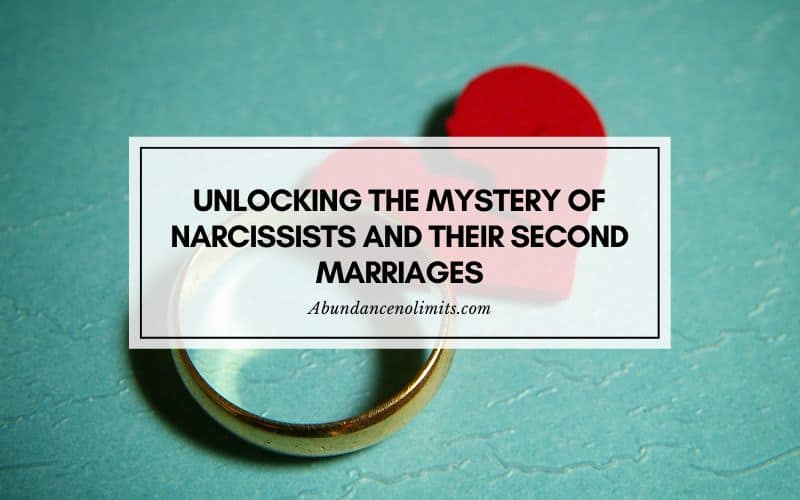Navigating the complex world of relationships can be challenging, especially when dealing with individuals who possess narcissistic traits. One may wonder why a person displaying such characteristics often ends up in second marriage.
This blog will delve into the motivations behind this remarriage, discuss how to spot red flags in potential partners and explore coping strategies for those in a relationship with a narcissist.
Read on to gain valuable insights into the intricacies of narcissism within the context of second marriages and better understand its impact on both partners involved.
Characteristics of Narcissists And Their Impact On Relationships
Narcissistic Personality Disorder (NPD) is characterized by an inflated sense of self-importance, a need for admiration, and a lack of empathy for others.
Individuals with this disorder often have grandiose fantasies about their abilities, achievements, and relationships. They may also harbor deep insecurities that drive them to seek constant validation from those around them. This makes it difficult for them to maintain healthy and balanced relationships.
In romantic partnerships, narcissists can be manipulative and controlling, as they primarily focus on fulfilling their own needs at the expense of their partner’s well-being.
They may shower their partners with compliments in the beginning stages of the relationship – known as love bombing – which can lead to an intense emotional connection early on.
However, once they feel comfortable in the relationship or no longer receive the adoration they desire, narcissists often resort to devaluing their partner through criticism or gaslighting – making them doubt their perceptions and experiences – causing significant distress to both parties involved. As a result, these toxic dynamics can contribute to high dissatisfaction rates and eventual separation in relationships involving narcissists.

Reasons Why Narcissists Get A Second Marriage Quickly
Narcissists often get a second marriage for the same reasons as anyone else. They may feel lonely, desire companionship, or be romantically attracted to someone new. However, there are a few distinct motivations behind why narcissists may be keen on quickly remarrying:
1) Fear Of Being Alone
Narcissists hate being alone as they depend heavily on external validation and attention. This fear of abandonment can drive them to rush into a second marriage, even if it means settling for a less-than-ideal partner.
In their minds, any relationship is better than none at all. Being alone forces narcissists to confront their internal emotional emptiness and face the possibility that they may not be as important or special as they think.
Furthermore, the prospect of being single can threaten a narcissist’s sense of control over their life. They see themselves as deserving of admiration, respect, and love from others, so being without someone who assures them of these things can be terrifying.
Narcissistic individuals often cling to relationships out of fear rather than genuine love or attachment to their partner. As such, ‘fear’ becomes one reason why multiple marriages are common among narcissists.
2) The Thrill Of The Chase
For narcissists, the thrill of the chase is a major motivator for remarrying quickly. They are often addicted to the rush of pursuing and winning over a new partner. This behavior stems from their need to feel powerful and in control of others and their constant craving for external validation.
Narcissists may put on an elaborate façade during courtship, showering their new love interest with attention, gifts, and affection.
However, once they have secured the relationship, they may revert back to their controlling or abusive behaviors. The allure of capturing someone’s attention and admiration can be too great for narcissists to resist.
One example is when a wealthy person divorces their spouse and remarries immediately afterward to someone else with substantial assets or income.
Narcissistic individuals see this as a way to obtain more status and prestige by aligning themselves with someone who can provide financial security. The thrill of gaining power through wealth is a potent motivation for some narcissistic people seeking second marriages.
3) The Search For Control And Power
Narcissists have an insatiable need for control and power, often motivating them to seek a second marriage. They relish the idea of having someone completely dependent on them, and they use their partner’s vulnerability to maintain dominance in the relationship.
Narcissistic partners may manipulate their spouse into making all important decisions while preventing them from pursuing independent interests.
The search for control is also apparent in how narcissists treat their new partners. They may love to bomb their partner with grand gestures or lavish gifts like an exotic vacation or buying expensive jewelry.
This gives them leverage over their spouse since they feel indebted for such actions. The more influence a narcissist has over someone, the more secure it makes them feel about themselves.
In many cases, a narcissist also wants to be the center of attention and adoration in their second marriage. Their incessant need for external validation can create a cycle of unhealthy behaviors that ultimately hurt both parties if left untreated.
These individuals will go out of their way to ensure that everyone knows how great they are at everything—especially regarding relationships—further fueling this hunger for power and control.
4) Need For Validation And Attention
Narcissists have an insatiable need for validation and attention. This is a fundamental aspect of their personality disorder.
They are driven to seek admiration, praise, and recognition from others because it reinforces their image of themselves as special, important, and superior to everyone else.
In a second marriage, this need can become even more pronounced as narcissists seek out new sources of validation after the collapse of their previous relationship.
For example, many narcissists may rush into a second marriage to prove something to themselves or others. They may feel like they failed in their first marriage and desperately want to show they can succeed at love again.
Alternatively, some narcissistic individuals may seek partners who are younger or more successful than them to boost their status and self-image.
Whatever the motive behind the second marriage may be, it is ultimately driven by the narcissist’s deep-seated desire for validation and attention.
Challenges In Second Marriages With Narcissists
However, these second marriages may be fraught with difficulties, as the narcissist’s need for control and attention can lead to an unhealthy dynamic. Here are some of the common challenges people may face when marrying a narcissist:
Difficulty Building Trust
Building trust within marriage is essential for success, yet it can be difficult when one’s partner is a narcissist. Narcissists often prioritize their needs over those of their spouse, making it hard to establish trust.
They may also have difficulty communicating effectively or taking responsibility for their actions, further damaging trust in the relationship.
Additionally, narcissistic behavior, such as infidelity and a lack of emotional intimacy, can lead to further hurt. Building trust with a narcissistic spouse requires patience, understanding, and communication.
Lack of Empathy and Emotional Intimacy
Narcissists lack empathy and the ability to form genuine emotional connections, making it difficult for second marriages to build trust and intimacy.
They also engage in emotionally abusive behaviors such as gaslighting and manipulation, taking a significant toll on their partner’s mental health.
To cope with these issues, it is vital to set clear boundaries that protect one’s physical and emotional well-being, seek professional help from therapists specializing in personality disorders, and practice self-care through mindfulness activities.
Risk of Emotional and Psychological Abuse
As narcissists prioritize their own needs above all else, second marriages with them can be more susceptible to emotional and psychological abuse, given their difficulty in relating to the feelings of others.
They may attempt to manipulate the victim through lying, denying certain events occurred, or blaming the victim for their actions.
Victims of this type of abuse may suffer from long-term damage such as depression, anxiety disorders, or PTSD-like symptoms after leaving the relationship.
Conclusion
Narcissists are known to rush into second marriages for their own benefit. They seek validation, attention, and control over their partners.
Although there may be many red flags in a second marriage with a narcissist, coping strategies such as setting boundaries and focusing on self-care can help you survive the relationship.
Recognizing when someone is displaying narcissistic traits or behaviors before entering into any serious commitment is essential.
Remember, your emotional well-being should always come first in any relationship, especially when dealing with an extreme form of a personality disorder like narcissism.
FAQs:
Narcissists are driven by an insatiable desire for attention, admiration, and control over others. A second marriage allows them to manipulate and dominate their partner to fulfill these needs.
Narcissistic individuals feel entitled and require constant validation from those around them. They may also lack empathy or emotional connection with their partners, leading to volatile or dysfunctional relationships.
While difficult, some narcissistic individuals may be willing to undergo therapy and address the patterns contributing to their previous relationship problems. However, success depends on the individual's willingness to acknowledge flaws and commit themselves fully to self-improvement.
Warning signs of a potential narcissist include grandiosity, an excessive need for attention or admiration, disregard for other people's emotions or feelings, manipulative behavior, using people as tools rather than genuine connections/partnerships, etc. It's important, however, not to assume any particular diagnosis without consulting a qualified healthcare professional/therapist trained in psychology!


